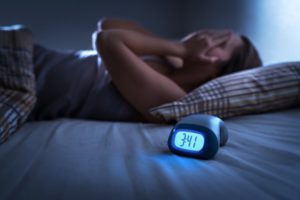
Millions of Americans are dealing with some form of sleep apnea, a condition that prevents them from getting a good night’s rest. The most common form of the condition is Obstructive Sleep Apnea (OSA), which refers to a full or partial blockage of the airway that triggers temporary stoppages in breathing. With that in mind, is there a connection between weight gain and sleep apnea? Continue reading to get the answer from a local sleep dentist.
Weight Gain vs. OSA – Which Comes First?
When there is excessive weight gain, it increases the neck girth. The added mass can place pressure on the throat muscles, making them flaccid while sleeping. This can obstruct the airway and cause stoppages in breathing. A common sign of this is loud snoring and gasping sounds while asleep.
It’s not always weight gain that brings about OSA, though. People who don’t get adequate rest at night are more susceptible to becoming obese. This is partially caused by disruptions in the body’s circadian rhythm (its natural internal clock) and the ensuing hormonal imbalances. Lack of sleep can also create an energetic deficit, which makes people suffering from OSA less likely to exercise. Thus, they are more likely to become overweight.
How Weight Loss Can Help
While weight loss, alone, can’t cure OSA, it can make a significant impact. Studies show that dropping just 10-15% of one’s current weight can reduce the severity of OSA by 50%. Dietary and exercise changes can also help to reduce blood pressure, improve cardiovascular health and make the body more responsive to insulin.
The Value of Working with a Sleep Dentist
In addition to making healthy lifestyle changes, working with a skilled sleep dentist can help tremendously in addressing OSA. However, it starts with being properly diagnosed. If you notice any of the following symptoms, bring it to your primary physician’s attention so you can take a sleep test:
- Loud, chronic snoring
- Gasping for air or waking up feeling out of breath
- Morning headaches
- Sore throat or dry mouth in the morning
- Severe daytime lethargy
- Difficulty focusing or remembering things
- Mood swings
- Sexual dysfunction
- High blood pressure
With a professional diagnosis, you can explore your treatment options by speaking with a local sleep dentist. Instead of the traditional means of treating OSA with a CPAP (continuous positive airway pressure) machine, many patients are choosing the more convenient alternative – a custom oral appliance. Specially designed to fit comfortably inside your mouth, it gently shifts the jaw forward to allow for unobstructed breathing.
If you suspect that you’re dealing with OSA, now is the time to take action. Doing so will help control your weight and allow you to make significant improvements in your overall health!
About the Author
For nearly 40 years, Dr. Thomas A. Gromling has been providing careful and considerate dental care to his community. A graduate of the Medical College of Virginia at Virginia Commonwealth University, he has received additional advanced training in treating OSA. Dr. Gromling also maintains professional affiliation with the American Academy of Dental Sleep Medicine, American Academy of Sleep Medicine and Virginia Academy of Sleep Medicine. He treats OSA at his private practice, and he can be reached for more information or to schedule a visit through his website.
